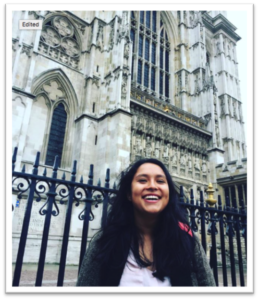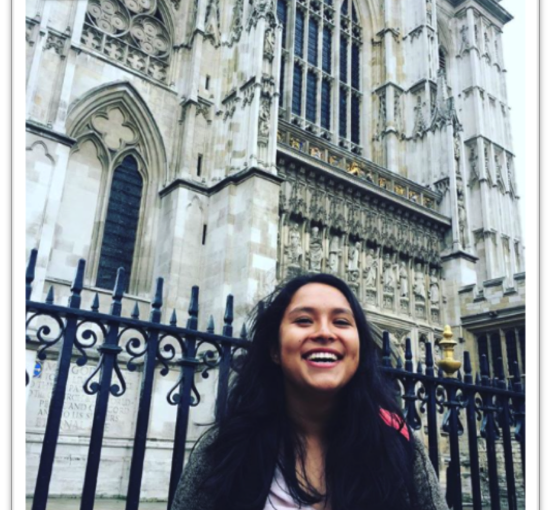Meet Claudia Santillan; born in Mexico and raised in Atlanta, she is a free spirit with arguably the biggest heart of anyone I have ever met.
Claudia is a psychology major at the University of North Georgia and is studying abroad at the University of Chester in the U.K. for an entire year.
From roaming the streets of London in search of a hostel to telling me about her family’s journey of becoming United States citizens, my interactions with Claudia were never anything short of an adventure.
Emily Wotzka (EW): You were born in Mexico and then moved to the U.S. when you were eight. What was that like?
Claudia Santillan (CS): I was born and grew up in a small town of less than 100 people. The population today is still less than 100 people.
Growing up, I was raised by my mom with my siblings. She took care of us. My dad would only visit us once a year because he lived in the United States and he provided for us. He made sure we had a good life.
So back then, we were probably the richest people in our town, mostly because my dad would send us money. That’s not the life my mom wanted.
She wanted all of us to be together as one family, and so my dad worked really hard for over six years to get my siblings and I residence cards to become United States citizens. He wanted to make sure that we did everything right, and he didn’t want us to cross illegally. So it took a long time.
But when I was eight, we finally moved to Georgia, and for the first time we were a family. Growing up, it really showed me how to appreciate everything.
EW: Do you identify yourself as an American or as a Mexican? Or Both?
CS: I love this question. This is actually one of the questions I keep reflecting back on. I’ve never, ever really questioned my nationality until I got here when I was introducing myself.
I have lived about 70 percent of my life in America. I’m going to be honest, I identify more as an American than as a Mexican because of the culture.
I feel like I believe more in the American values. The culture is very progressive and individualistic. There are more opportunities here.
When I go back to Mexico, I am an outsider there. I might be the same skin color, I might be the same shape, I might have been born there, but when I go there, I am an outsider to them. Their beliefs are very traditional. The women are usually at home cooking and that’s just what’s expected.
I just don’t feel comfortable being myself in that culture, or at least I don’t understand that culture.

Claudia Santillan enjoying being abroad to absorb another culture into her life.
EW: How does it feel when you go back to Mexico to visit your family?
CS: I believe we live in a really materialistic world, and so whenever I went back to Mexico, I really noticed how little people have compared to us.
A normal American house, to them, would be a five-star hotel. I just realized that they found happiness even if they didn’t have anything. They rely a lot on communication and family and having people to support them.
To me, it was a very insightful moment — realizing that I didn’t really need all of that materialistic stuff. It really made me appreciate where I come from.
EW: Do you think your unique perspective has changed how you live?
CS: I would say so. I mean, over the years I have learned that money is just a piece of paper. It only has meaning if you give it meaning. But it does affect how you live your life.
Instead, I like to invest in people. I see the beauty in things everywhere I go, including in people. I see potential in people. And if I see that they could benefit from my own money in the long term for their happiness or their health, that is a better way of using my money than buying a computer or a fancy iPhone.
To me, investing in people means that I get to give my money to my mom, to help her get home to Mexico so she doesn’t feel homesick. Or I get to give money to my sister so she can travel the world to help her with her depression. That, to me, is more meaningful because I know in the long term, it’s going to help them, but it’s going to come back to me too.
It’s kind of like investing in people. You invest, but you know you’re going to get something back. I’m receiving their happiness too. If I believe in someone and I see potential in them, I will do it.
It does go back to the whole happiness thing. I know I can survive on nothing and still be happy. And if investing in people makes me happy, then I guess I’m doing something right.
